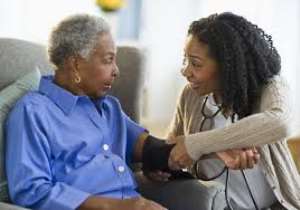
Step 1
Inspect the home for safety first. Assess risks such as fall hazards that may be caused by loose rugs that slip under shoes or walkers, cluttered furniture that makes navigation difficult or areas of the house that may offer difficulty to the elderly (such as stairs).
Check smoke and carbon monoxide detectors to make sure they are in working order. If your home or your parent's home does not have these detectors, install them. Make sure lamp cords or appliance wires are tucked safely against baseboards or snaked under rugs or otherwise taped or tacked down to prevent slips and falls.
Step 2
Install grab bars in the bathroom for added security and for help with climbing into and out of a bathtub or shower. Grab bars may also be installed around toilets for added support, which helps prevent slips.
Step 3
Install non-skid strips or pads in the bathtub or shower as well as in front of the bathing area to help prevent falls. If bathroom rugs are used on linoleum, make sure they can be tacked or fastened to the floor with anti-skid strips, tacks or other fasteners. All electrical appliances in the bathroom should be unplugged until ready to use and be kept away from sources of water.
Step 4
Install nightlights at strategic areas around the house; for example in the parent's bedroom and in the hallway outside of the bedroom so mom can make her way to the bathroom in the middle of the night. Place nightlights in the bathroom and kitchen and living areas as well to help provide a bit of illumination during nighttime hours without having to leave lights on.
Step 5
Provide mom and dad with easy access to a telephone or call monitor in the bedroom that offers them an easy communication route to caregivers. Get them a cellphone and install emergency phone numbers. Encourage them to keep it in their pocket while you're away. Check up on mom every few hours if you're busy at work, or make arrangements for neighbors to perform regular or daily checks on parents. Anyone involved in helping care of elderly parents should have an emergency phone list of doctors and who to call in an emergency, as well as medical information about the person, such as whether dad is a diabetic or mom is suffering from cardiac issues.
Step 6
Arrange a schedule for you or other family members or friends to help get mom or dad to doctor's appointments, pick up prescriptions or grocery shopping, cooking and do cleaning for your parents. The task may be difficult for only one person, and physical and emotional support is essential. If your parents need more physical care than you are capable of giving, such as help with bathing or ambulating, you may need to consider hiring home health services in your community.




 Meta releases new version of conversational AI across its platforms
Meta releases new version of conversational AI across its platforms
 Cape Town named Africa’s Best Airport 2024 by Skytrax
Cape Town named Africa’s Best Airport 2024 by Skytrax
 Bono East: Four injured after hearse transporting corpse crashes into a truck
Bono East: Four injured after hearse transporting corpse crashes into a truck
 ‘Be courageous, find your voice to defend our democracy’ — Sam Jonah urges journ...
‘Be courageous, find your voice to defend our democracy’ — Sam Jonah urges journ...
 Exodus of doctors, nurses and teachers have worsened because of unserious Akufo-...
Exodus of doctors, nurses and teachers have worsened because of unserious Akufo-...
 2024 election: Avoid insults, cutting down people in search of power – National ...
2024 election: Avoid insults, cutting down people in search of power – National ...
 ‘You passed through the back door but congratulations’ — Atubiga on Prof Jane Na...
‘You passed through the back door but congratulations’ — Atubiga on Prof Jane Na...
 Government’s $21.1 billion added to the stock of public debt has been spent judi...
Government’s $21.1 billion added to the stock of public debt has been spent judi...
 Akufo-Addo will soon relocate Mahama’s Ridge Hospital to Kumasi for recommission...
Akufo-Addo will soon relocate Mahama’s Ridge Hospital to Kumasi for recommission...
 We must not compromise on our defence of national interest; this is the time to ...
We must not compromise on our defence of national interest; this is the time to ...
